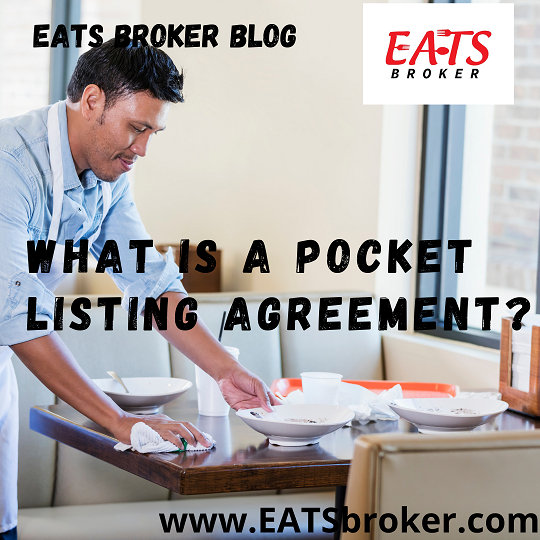In the real estate industry in the United States, a pocket listing or hip pocket listing is a property where a broker holds a signed listing agreement (or contract) with the seller, whether that be an “Exclusive Right to Sell” or “Exclusive Agency” agreement or contract, but which is never advertised nor entered into a multiple listing system (MLS) according to Wikipedia.
Restaurant Brokers will usually require an exclusive listing agreement ranging for 6-12 months before working with a restaurant owner. Why would a Restaurant Broker want an exclusive agreement? Why would a seller want a pocket listing or open listing agreement?
Dominique Maddox a Restaurant Broker and Founder of EATS Restaurant Brokers says, “selling a restaurant as a pocket listing can be challenging. Not advertising a restaurant for sale on the major business brokerage websites puts a restaurant at a major disadvantage of selling. Our firm feels like a pocket listing should only be considered on listings over $2 million listing price”.
Pocket Listing Agreement- How to find them?
The reasons for a seller choosing the option of a pocket listing may vary from the need of privacy, worries of the public finding out, employees finding out, or overall fear. Selling a restaurant vs selling a home as a pocket listing or finding listings has some different challenges.
Residential- real estate agents can easily go on the Multi Listing Services (MLS) to find a list of homes that have expired, canceled, or withdrawn. Knock on home-owners doors, or send a mailer with advertisement to gauge interest.
Restaurants- restaurant brokerage does not have a Multi Listing Service (MLS) to view expired, canceled or withdrawn listings. Restaurants usually will not have an open house or sign in front of the restaurant. Finding the owner is not as easy as knocking on the door.
Restaurant Brokers will usually have clients contact them directly to explore the option of selling a restaurant as a pocket listing.
Pocket Listing vs Open Listing Agreement
The biggest differences between the two are a Broker has signed a listing agreement (or contract) with the seller, whether that be an “Exclusive Right to Sell” or an “Exclusive Agency” agreement or contract. Brokers agree not to advertise restaurants for sale to the public but only offer exclusive buyers.
Open listing can refer to a restaurant for sale whose owner is using multiple Restaurant Brokers in order to find as many potential buyers as possible. The Broker who brings in the ready, able and willing buyer for the restaurant collects the commission. Restaurant Brokers will be reluctant to take on an open listing because of the lack of commitment by the seller to work with them exclusively.
Pocket Listing- Pros and Cons
Pros
– Privately shop the buyer market to find out initial interest
– Chance to test listing price
– Exclusive buyers want to be the first to know about a successful restaurant going up for sale
– Less chance of anybody finding out about sell
Cons
– Not listed on The Internet’s Largest Business for Sale Marketplace
– Finding a buyer can be more challenging
– The lower success rate of selling
– Restaurant Brokers usually pay less attention to these listings
For more information on the restaurant market and other available consulting services or restaurant valuations, contact Dominique Maddox at 404-993-4448 or by email at [email protected]. Visit our website at www.EATSbrokers.com


